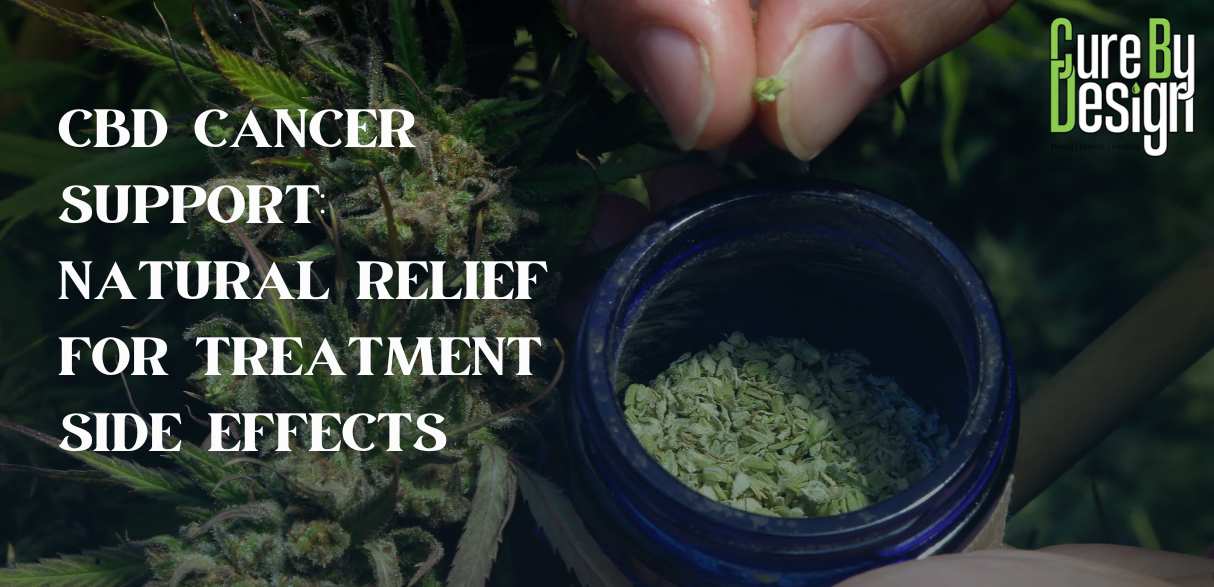
Blog
CBD and Cancer: What You Need to Know

Cannabidiol (CBD), a non-psychoactive compound from the Cannabis sativa plant, has emerged as a subject of interest for its possible benefits in cancer treatment. It interacts with the endocannabinoid system to inhibit cancer cell growth, induce programmed cell death, and prevent metastasis. Real case studies highlight promising results: one clinical trial showed that patients with glioblastoma experienced reduced tumor growth when it was combined with THC. Another study found breast cancer patients reported less pain when using it alongside standard treatments. While generally well-tolerated, side effects can occur. Patients should speak with their oncologist before considering it to ensure safety and effectiveness in their treatment plan.
Understanding CBD and Its Role in Cancer
Cannabidiol (CBD) is a prominent compound derived from the Cannabis sativa plant, known for its non-psychoactive properties. Unlike THC, another well-known compound in cannabis, it does not produce a high, making it more appealing as a potential therapeutic agent. Researchers have been exploring it’s effects on cancer treatment, given its reported anti-cancer properties. It interacts with the body’s endocannabinoid system, which is involved in regulating several physiological processes, including pain, inflammation, and immune response. This interaction may lead to inhibiting cancer cell growth, inducing apoptosis (or programmed cell death), and preventing the spread of cancer cells to other parts of the body.
Several clinical studies have provided insights into the role of CBD in cancer treatment. For example, a trial involving patients with glioblastoma multiforme (GBM) indicated that the combination of CBD and THC led to reduced tumor growth and improved patient quality of life. Similarly, breast cancer patients who received it alongside traditional treatments reported less pain and better responses to chemotherapy. In another case, a patient with advanced pancreatic cancer experienced notable tumor reduction after using a CBD oil extract in conjunction with conventional chemotherapy. Furthermore, animal studies have shown that it can effectively reduce tumor sizes in colon cancer models, prompting further investigation in human trials. These findings suggest that it may offer a complementary approach to cancer treatment, enhancing the overall therapeutic experience for patients.
How CBD Works Against Cancer Cells

It interacts with the body’s endocannabinoid system, which helps regulate various functions such as pain, mood, and immune responses. This interaction is key to its potential anti-cancer effects. One important mechanism is it’s ability to inhibit the proliferation of cancer cells. Studies suggest that it can prevent cancer cells from multiplying, essentially slowing down the growth of tumors. Additionally, CBD may induce apoptosis, or programmed cell death, in cancerous cells. This is crucial because it allows the body to eliminate damaged or abnormal cells effectively. CBD also shows promise in preventing metastasis, which is the spread of cancer to other parts of the body. For instance, research on animal models has demonstrated that CBD can reduce the size of tumors in colon cancer, suggesting it could potentially help in managing other cancers as well. Together, these mechanisms highlight how CBD might work against cancer cells, offering a complementary approach to traditional treatments.
Notable Clinical Studies on CBD and Cancer
Several notable clinical studies have explored the impact of CBD on cancer treatment, revealing promising results. One prominent study involved patients with glioblastoma multiforme (GBM). This trial found that when it was combined with THC, patients experienced reduced tumor growth and an improved quality of life, demonstrating the potential of CBD in enhancing conventional therapies.
Another significant case focused on breast cancer patients who received it alongside traditional treatments. Participants reported a decrease in pain levels and a better response to chemotherapy, suggesting that it may help mitigate some of the side effects associated with standard cancer treatments.
In a particularly striking case, a patient with advanced pancreatic cancer saw a notable reduction in tumor size after using a CBD oil extract in conjunction with chemotherapy. This patient reported fewer side effects and a greater tolerance for treatment, which highlights it’s potential to improve patient comfort during rigorous cancer therapies.
Animal studies have also provided insights into it’s effects on cancer. Research indicated that it reduced tumor size in models of colon cancer, paving the way for further investigations in human trials. These studies underscore the need for continued research to fully understand how it can be integrated into cancer treatment protocols.
| Case Study | Cancer Type | Outcome | Notes |
|---|---|---|---|
| Case Study 1 | Glioblastoma Multiforme | Reduced tumor growth | Combined with THC, improved quality of life. |
| Case Study 2 | Breast Cancer | Decreased pain, improved response to chemotherapy | Administered alongside conventional treatments. |
| Case Study 3 | Pancreatic Cancer | Significant tumor reduction | Used oil extract with standard chemotherapy. |
| Case Study 4 | Colon Cancer | Reduced tumor size | Effective in animal models, prompting further human trials. |
Exploring Side Effects of CBD Use

CBD is generally considered safe for most people, but it can come with some side effects. Commonly reported issues include fatigue, diarrhea, and changes in appetite. These effects are usually mild and temporary. However, some individuals might experience more significant side effects, such as dry mouth, dizziness, or low blood pressure. It’s important to note that it can interact with other medications, particularly those that come with a ‘grapefruit warning.’ This means that if you take medications metabolized by the liver, it could affect how those drugs work in your body. For instance, it might enhance the effects of blood thinners, leading to increased bleeding risk. Therefore, consulting with a healthcare provider before starting it is crucial, especially for cancer patients who may be on multiple medications. Always choose high-quality, lab-tested CBD products to minimize risks and ensure you are using safe and effective formulations.
Current Legal Status of CBD for Cancer Treatment
The legal status of CBD for cancer treatment varies widely across different regions. In the United States, the 2018 Farm Bill legalized hemp-derived CBD containing less than 0.3% THC at the federal level. However, individual states have their own regulations regarding the sale and use of its products. Some states allow this for medical use, while others may have restrictions or require a prescription. Patients should consult local laws to ensure compliance and to understand their rights regarding its use in cancer treatment. It’s also important to note that while it is available over the counter in many places, the FDA has not approved any CBD products specifically for cancer treatment. This regulatory ambiguity can lead to challenges in accessing reliable and safe products. Therefore, patients are encouraged to seek products that are third-party tested for quality and efficacy.
Future Research Directions for CBD in Oncology
Research on CBD’s role in oncology is still in its early stages, but several promising avenues are emerging. One significant focus is on understanding the optimal dosage and delivery methods for CBD in cancer treatment. Current studies vary widely in their dosages and formulations, making it difficult to determine what works best for specific types of cancer. For instance, researchers are investigating whether higher doses or combination therapies can enhance the effects of CBD alongside traditional treatments like chemotherapy or radiotherapy.
Another important area is the exploration of CBD’s effects on different cancer types. While some studies have shown positive results in glioblastoma and breast cancer, there is a need for more comprehensive research across various cancers, including lung, prostate, and colon cancers. Animal studies have laid the groundwork, but translating these findings into human trials will be crucial for validating CBD’s therapeutic potential.
Furthermore, researchers are beginning to look at the long-term effects of CBD usage in cancer patients. Understanding how prolonged use impacts overall health and cancer progression will be essential in establishing it as a standard treatment option. Additionally, investigating the interaction of CBD with conventional cancer medications is vital, as this could influence treatment protocols and patient outcomes.
Finally, the safety profile of CBD, especially in combination with other therapies, needs more scrutiny. Although it is generally well-tolerated, comprehensive studies that monitor adverse effects over extended periods will help clarify its role in cancer care and ensure patient safety.
Patient Recommendations for Using CBD
Patients considering it as part of their cancer treatment should engage in open discussions with their oncologist. It’s crucial to evaluate individual health needs, current treatments, and potential interactions with medications. For those interested in trying CBD, focusing on high-quality, lab-tested products is essential. This ensures that the CBD is free from harmful contaminants and contains the advertised amount of cannabinoids. Patients should also start with a low dose and gradually increase it while monitoring their body’s response. Keeping a journal of effects can be helpful for discussions with healthcare providers. Additionally, patients should be aware of the legal status of CBD in their location and ensure that any product they consider complies with local regulations.
- Consult with a healthcare provider before starting it treatments.
- Start with a low dose to assess your body’s response.
- Keep a journal of your experiences and any side effects.
- Consider using full-spectrum CBD for enhanced effects.
- Be aware of potential interactions with other medications.
- Research reputable brands and third-party lab testing.
- Stay informed about evolving research and legal regulations.
Frequently Asked Questions
1. Can CBD help with cancer treatment?
It might help some cancer patients by reducing pain and improving their quality of life, but it should not replace traditional cancer treatments.
2. Is CBD safe for cancer patients?
Itis generally considered safe for most people, including cancer patients. However, it’s important to talk to a doctor before using it.
3. How does CBD interact with cancer medications?
It can affect how some cancer medications work, so it’s essential to consult with a healthcare provider about any possible interactions.
4. Can CBD help with the side effects of cancer treatment?
It may help ease side effects like nausea and pain from cancer treatments, but you should discuss it with your doctor.
5. Are there any studies on CBD and cancer?
Research on CBD and cancer is still ongoing. Some studies suggest potential benefits, but more research is needed to confirm these effects.
TL;DR This blog post discusses the potential role of CBD in cancer treatment, highlighting its anti-cancer properties and mechanisms of action. It reviews notable clinical studies indicating reduced tumor growth and improved patient outcomes when It is used alongside traditional therapies. While It is generally well-tolerated, side effects can occur, and legal status varies by region, necessitating patient consultation with healthcare providers. Future research is essential to establish optimal dosages and long-term effects.

